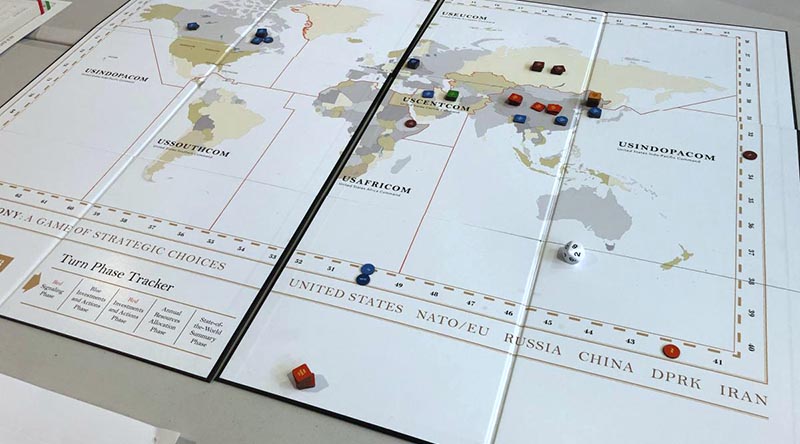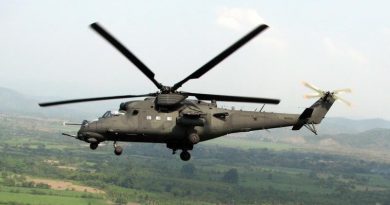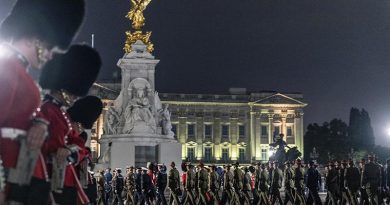Global strategic war gaming at Defence HQ

Intelligence indicates enemy are attempting to posture in north-east Africa, threatening free passage through the Gulf of Aden.
CAPTION: A view of the Hedgemony game board during a trial game at Russell Offices, Canberra. Photo and story by Sergeant Sebastian Beurich.
In a situation room, friendly force officers face dilemmas – do they divert resources and increase the forces’ readiness to respond? Do they continue modernising the existing forces? Or do they commit resources to research and develop new forces?
Luckily, they’re not engaged in a real situation, but sitting around a table in Defence’s Russell Offices, Canberra, earlier this month, playing the board game Hedgemony.
Interested onlookers whisper about choices made during the war game, which was developed by the RAND Corporation, and was being played to demonstrate how it could be useful for Defence’s strategy and policy areas.
Defence’s Director of Strategic Wargaming Darren Huxley said that although the game was developed for the United States, the framework and decisions made in Hedgemony resonated in Australia.
“At that level, we usually rely on scenario-driven seminar-type games to start conversations around strategic choices,” Mr Huxley said.
A seminar has a group discussing a scenario and can be extended into a tabletop exercise, which involves two groups facing off.
Mr Huxley said another common wargaming technique in Defence was system games, like Hedgemony, which had rules to govern the experiment and were repeatable as a result.
“Although you might have the same framework, the choices available to players in a seminar game are wildly different, depending on their background,” Mr Huxley said.
“We do most of our work at the policy level, where we pull apart a question or take assumptions that have come out of force design.
“The framework itself will never answer the question – it provides the basis from which we can discuss the problem, and lead into submissions to Defence committees or government.”
Hedgemony focuses on how resources are allocated to building capability within the blue force, while also reacting to decisions made by red players.
Although similar systems-based games are used at the tactical level, they largely don’t exist to evaluate strategic options or outcomes.
This risks losing a wealth of experience, according to Mr Huxley.
“We can ask the Chief of the Defence Force, with all of his experience, why he chose one option over another,” he said of Hedgemony.
“All of his experience probably tells him which option is right, but we can add that to the collected experience of thousands of years of officers’ decision-making by wargaming across the department.”
Wargaming has long been a part of junior officer and non-commissioned officer training.
“But an Australian-based version of Hedgemony’s framework, focused less on world policing and more on influence and diplomacy, would be beneficial to more organisations than just Defence,” Mr Huxley said.
Departments like Foreign Affairs and Trade could use it to evaluate diplomatic decisions, or Treasury could discuss the ramifications of a new policy.
“Ultimately, any form of wargaming is about making a decision and then analysing why that was made,” Mr Huxley said.
“It provides us with a space where we can practise decision-making against a live, thinking and reactive opponent.
“The Hedegmony demonstration was about the utility of the game in an Australian context, but also about advertising the value of this sort of activity for strategy and policy conversations across Defence and government.”
.
.
.
.
.
.

.
.





